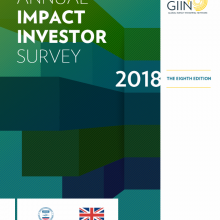Annual Impact Investor Survey 2018

Annual Impact Investor Survey
In its eighth edition, this year’s survey provides in-depth analysis of market activity and trends, covering topics such as: capital allocations by sector and geography, indicators of market development and industry challenges, approaches to impact measurement and management, and satisfaction with financial and impact performance. The report includes a five-year trends analysis of growth and changes in the industry. It also presents extensive information on many aspects of today’s impact investing market and sheds light on investors’ perspectives on a variety of current market topics such as: strategies to preserve impact integrity, the level of importance of various technologies to the future of impact investing, the role of public policy, and the role of blended finance.
This study aims to depict the current state and trends of the impact investment market. Impact investment targets financial returns, alongside generating social and/or environmental impact. GIIN offers insight into impact Investment by annually collecting data from actors in the market. In 2018, they analysed information from 229 participants with a combined impact investment portfolio of 228.1 billion dollars.
Key recommendations:
- Protect the integrity of the industry by preventing impact washing, i.e. investments not committed to impact
Importance for businesses
- Snapshot of market participants opinions on the growth and development of the impact investing industry
Importance for policymaker
- Identification of structural challenges in impact financing
- Description of industry trends over the last five years as well as predictions for future developments
The authors see impact investment as a thriving market that signals transformational shift in the investment industry by bringing social and environmental impact into focus. They draw five conclusions:
The market is diverse: Impact investors display a wide range of features in terms of geographical focus, asset class, investment focus, target returns, headquarter locations and type of organizations. Further, the size of investment varies. Out of the 228.1 billion dollars in impact investment under management recorded in this survey, 38% stemmed from two respondents.
The impact investment industry is growing: Respondents plan to increase their investment in 2018 by 8 % compared to 2017. Further, half the survey respondents made their first impact investment in the last 10 years. This indicates a growing industry. Investors also signal a shift within companies away from conventional investment and towards impact investment.
Impact investors demonstrate a strong commitment to measuring and managing impact: 76% of respondents set objectives to measure the impact of their investments. The majority of respondents targets both social and environmental goals. Many apply “lenses” to their investments to address specific issues such as gender inequality or climate change.
Impact investors report performance in line with both financial and impact expectations. 97% of respondents reported that their impact performance either met or outperformed expectations. The financial performance was in line or better for 91% of investors. There was little differences between emerging market and developed market investment performance.
Impact investors acknowledge the remaining challenges that need to be addressed within the industry: Amongst others, respondent name lacking research and data, missing high quality investment opportunities, and no availability of professionals with relevant skill sets as significant challenges for the growth of the industry. The highest risk in impact investments comes from business model execution and management risk, country and currency risk and liquidity and exit risk.